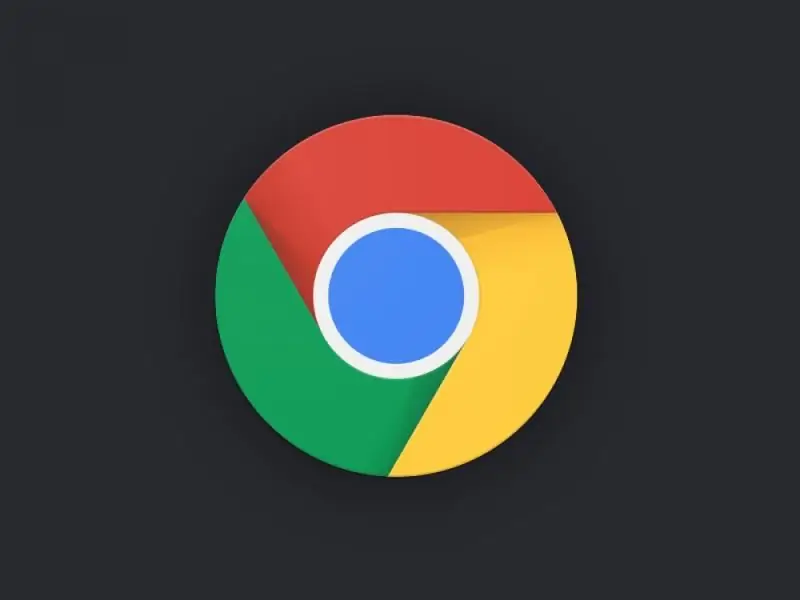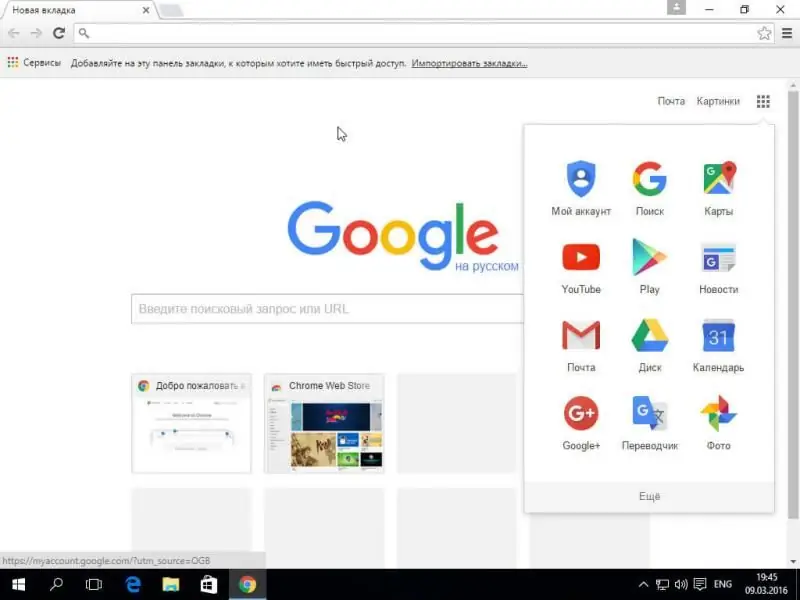
Table of contents:
- Author Bailey Albertson albertson@usefultipsdiy.com.
- Public 2024-01-19 10:46.
- Last modified 2025-01-23 12:41.
Causes of problems with video playback in the browser and how to solve them

Everyone uses web browsers in different ways. Someone - to search for news, someone - for work, and someone likes to spend their free time watching videos. However, sometimes problems arise when the video in the browser stops playing. The reasons can be different, and one must be able to identify and eliminate them.
Content
-
1 The most common causes and remedies
-
1.1 Outdated version of Adobe Flash Player
1.1.1 Video: How to Update Adobe Flash Player
-
1.2 JavaScript is disabled in the browser
- 1.2.1 Google Chrome
- 1.2.2 Opera
- 1.2.3 "Yandex Browser"
- 1.2.4 Mozilla Firefox
- 1.2.5 Safari
- 1.2.6 Internet Exproler
- 1.3 Other possible causes
-
-
2 Other problems with video playback in the browser and their solutions
- 2.1 Video does not open in full screen
- 2.2 Video plays without sound
- 2.3 Browser does not recognize video format
The most common causes and remedies
There are many different tools used to play videos in the browser, each of which plays an important role. If at least one element or program related to video playback does not work properly, problems may arise.
Outdated version of Adobe Flash Player
In the vast majority of cases, the reason for not being able to view a video lies in an outdated version of Adobe Flash Player, a browser extension that is launched when a video is played. Therefore, the first step is to check the version of this software tool. If it is outdated, update it.
The procedure for installing or updating Flash Player is independent of the browser you are using. You just need to adhere to the following algorithm:
- Go to the official website of the Adobe Flash Player developer.
- It is recommended to uncheck additional checkboxes in the website that opens. Otherwise, additional software will be installed on the computer, which is not related to Adobe Flash Player.
-
Then click the Install Now button. The download of the installer will begin.

Adobe Flash Player home page Uncheck the boxes to refuse additional software and start downloading the Flash Player installer by clicking the Install Now button
-
Run the downloaded file and the automatic installation of the latest version of Flash Player will start immediately.

Adobe Flash Player installation process We are waiting for the installation to complete
-
After a few minutes, the installer will notify the user that the process is complete. After clicking on the "Finish" button, the official Adobe website will open again, where you will be offered to familiarize yourself with other products of the company. You can safely close this tab.

Completing Flash Player installation Click Finish to complete the installation or update of Adobe Flash Player
If the problem was an outdated version of Adobe Flash Player, then it should be resolved at this point. Play the video that didn't play. If it is still not displayed, then you need to try other solutions to the issue.
Video: How to Update Adobe Flash Player
JavaScript is disabled in the browser
An important tool that affects the functionality of modern websites is JavaScript, a scripting programming language. Its use significantly expands the possibilities of creating and displaying websites. In each browser, this tool can be independently enabled or disabled. For most sites, disabling JavaScript will drastically reduce functionality. In particular, pictures may not be displayed and videos may not play.
The procedure for enabling JavaScript support depends on the browser you are using.
Google chrome
In Google Chrome, JavaScript support is enabled in the Privacy & Security settings.
-
Go to general browser settings. To do this, click on the characteristic icon in the upper right corner of the screen and select "Settings".

Login to Google Chrome Settings Clicking on the "Settings" line, go to the settings window of the Google Chrome browser
-
In the window that opens, you need to find the "Privacy and Security" section and select the "Content Settings" item in it.

Content settings in Google Chrome To activate JavaScript in Google Chrome, go to content settings
-
Select JavaScript from the list of content settings.

Switching to JavaScript in Google Chrome settings Open the JavaScript settings menu in Google Chrome by clicking on the JavaScript bar
-
It remains only to enable JavaScript support. To do this, click on the appropriate icon opposite the line "Allowed". If desired, in the same window, you can create a list of exception sites on which JavaScript will be prohibited.

Enabling JavaScript in Google Chrome Turn on the Javascript activation toggle switch in Google Chrome
Opera
In the Opera browser, JavaScript can be enabled in the browser settings by going to the "Sites" section.
-
As in the case of Google Chrome, you need to go to the browser settings. They can be opened with the key combination alt=+ P or in the standard way using the Opera icon in the upper left or right corner (depending on the browser version).

Entering the Opera settings menu Opening General Settings in Opera
-
Now you need to go to the "Sites" section on the left side of the settings menu.

Go to the "Sites" section of the Opera settings menu Open the "Sites" section in the "Opera" settings
-
We enable JavaScript using the appropriate radio button.

Enabling JavaScript in the "Sites" section Enable JavaScript in Opera using the "Allow JavaScript" radio button
Yandex browser
In Yandex Browser, you can enable or disable JavaScript support in the personal information settings section.
- At the top of the browser, click on the picture with three horizontal stripes and go to the "Settings" menu.
- Click on "Show advanced settings" at the bottom of the page that opens.
-
Find the "Personal Information" section and select "Content Settings".

Personal data section in the Yandex Browser settings console Go to the content settings in the personal data section of the Yandex.browser settings menu
-
Enter the JavaScript section and enable its use using the appropriate settings item.

Enabling JavaScript in Yandex. Browser Enable JavaScript using the "Enable JavaScript on all sites" radio button
Mozilla Firefox
JavaScript is always enabled by default in Mozilla Firefox. It can be turned off only if the user has done it himself using special tools. In this case, he does not need instructions to turn the function back on. You just need to re-enable JavaScript by the same means with which it was disabled.
Safari
JavaScript is turned on and off in the Safari browser in the security settings.
- Go to the Safari menu and go to the Preferences section and then the Security section.
-
Find the "Web content" block and enable the JavaScript support option in it.

Enabling JavaScript in Safari In the "Security" section of Safari preferences, in the "Web content" block, enable JavaScript support
Internet Exproler
In Internet Explorer, JavaScript can be turned on or off in the Internet section of the Security Settings Console.
- At the top of the browser window, find the gear-shaped button and click on it.
-
In the menu that opens, go to the "Security" tab and select the "Internet" zone. Then click the "Custom" button.

Internet Exproler main settings window Open the "Security" tab, go to the "Internet" zone, and then to the "Other" menu
-
In the Scripting section, find the Active Scripting and Scripting Java Applications blocks. In both blocks, you need to check the box next to "Enable".

Enabling JavaScript in Internet Exproler Security Settings To enable JavaScript, check the "Enable" items in the "Active scripting" and "Execute Java application scripts" boxes
- To save all changes, click on OK in all open windows.
After enabling JavaScript in any browser, you must restart the program for the changes to take effect
Other possible causes
There are other reasons why videos may not play in the browser. You should pay attention to them if the previous recommendations did not help to solve the problem. Try the following:
- check your current browser version; if it is outdated, then update it;
- clear your browser cache and cookies;
- check your computer for viruses - they can also interfere with video playback;
- check the internet connection is working: the problem may be in the network connection, and not in the software used; try restarting your router;
- perhaps the problem lies in the video player used by the site developers; try playing videos from other sites;
- try updating your video and audio drivers.
Other problems with video playback in the browser and their solutions
It so happens that the video is played, but some other problems arise. For example, the video plays without sound or does not open in full screen.
Video does not open in full screen
The video may not switch to full screen mode for several reasons. There are problems with the Adobe Flash Player plugin, the video card driver used by the video player or with the browser settings: full screen video playback is prohibited. It is recommended that you follow these steps in sequence until the problem is resolved:
- Install or update Adobe Flash Player to the latest version.
-
Update your graphics card driver.

Updating the graphics card driver in Windows Enter the "Computer Management" section, go to "Device Manager", open the properties of the video card and click the "Update driver" button
- Check installed extensions and plugins. It is possible that some software is blocking the ability to play videos in full screen mode. If so, then you need to disable the corresponding extension.
- Perhaps the fault is the player's developer, who did not provide for the possibility of full-screen playback. For example, YouTube videos cannot be viewed full screen if they are posted on Twitter. In this case, the problem cannot be solved.
Video plays without sound
If the sound disappeared during video playback, it is recommended to follow these steps step by step:
- Check the version and functionality of Adobe Flash Player.
-
The audio codec may have stopped working. It is recommended to install the K Lite Codec Pack, which includes all the codecs required for video playback. You can download it from the official site of K-Lite - Codec Guide. You can also install a special player KMPlayer, which contains a large set of codecs.

Installing the K Lite Codec Pack When installing, select the Advanced mode: it will maximize the capabilities of the package
- Perhaps the problem lies in the hardware. Check if the sound is turned on in the system, and if the speakers or headphones are connected correctly.
- Check the sound on another video. The problem may be with a specific video file.
The browser does not recognize the video format
This problem arises in connection with the active transition of site developers to the HTML5 system. In this case, the situation can be corrected quite simply:
- Check the version of the browser you are using and update it to the latest.
- Disable all active extensions and try to launch the video without them. Disable each plugin one at a time and try to play the video. In this way, you can find an extension that blocks video playback. Most likely, it is not compatible with HTML5 format.
- Install the K Lite Codec Pack.
Typically, these steps will fix the problem. But if none of this helped, then it remains to expect a bug fix in the next versions of the browser. In the meantime, you can install other software for browsing the Internet.
Various problems can occur with video playback in the browser. In most cases, they are resolved in a matter of minutes. The main thing is not to deviate from clearly prescribed instructions and to perform all actions as carefully as possible. Then very soon it will be possible to return to watching your favorite videos.
Recommended:
What To Do If, After Flashing Android, The Phone Or Tablet Does Not Turn On, Does Not See The Network, Does Not Charge

Why does my smartphone or tablet not work after changing the Android version. How to troubleshoot various problems. How to properly reflash a device
What To Do If Google Chrome Does Not Work - Reasons And Solutions For Problems With The Browser, Including When It Does Not Start

The reasons why Google Chrome does not work: does not start, pages do not open, a gray screen is displayed, and so on. Solutions with photos and videos
Why And What To Do If The Google Chrome Browser Does Not Open The Pages - List The Main Reasons And Describe Solutions To The Problem

For some reason, Google Chrome does not open pages. Solution by clearing the cache, editing the hosts file, cleaning the registry, reinstalling the browser, etc
What To Do If Yandex Browser Does Not Open On A Computer - Why The Program Does Not Start, How To Make It Work

Why "Yandex Browser" does not open in Windows. Solution to the problem: disabling autorun, updating and reinstalling the browser, clearing the cache and registry
What To Do If There Is No Sound In The Browser - Reasons And Solutions To The Problem, Step-by-step Instructions With Photos And Videos

Why the sound can suddenly disappear in the browsers. What measures should be taken to rectify the situation: we consider actions on the example of different browsers
